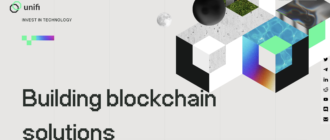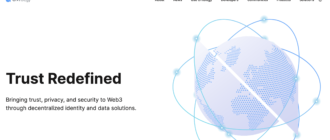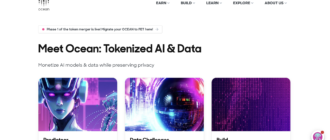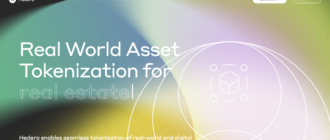Welcome to our detailed exploration of Algorand, a pioneering project at the forefront of the blockchain revolution. This article aims to dissect the various facets of Algorand, focusing on its unique technology, the structure and function of its native cryptocurrency ALGO, and the vibrant ecosystem surrounding it. We will delve into the technical underpinnings that differentiate Algorand from other blockchain platforms, analyze its tokenomics, and survey the expansive network of applications and services built on its framework. Additionally, we will assess Algorand’s growth potential and provide insights into future developments within this dynamic project. Join us as we unpack the intricate details that make Algorand a significant player in the blockchain space.
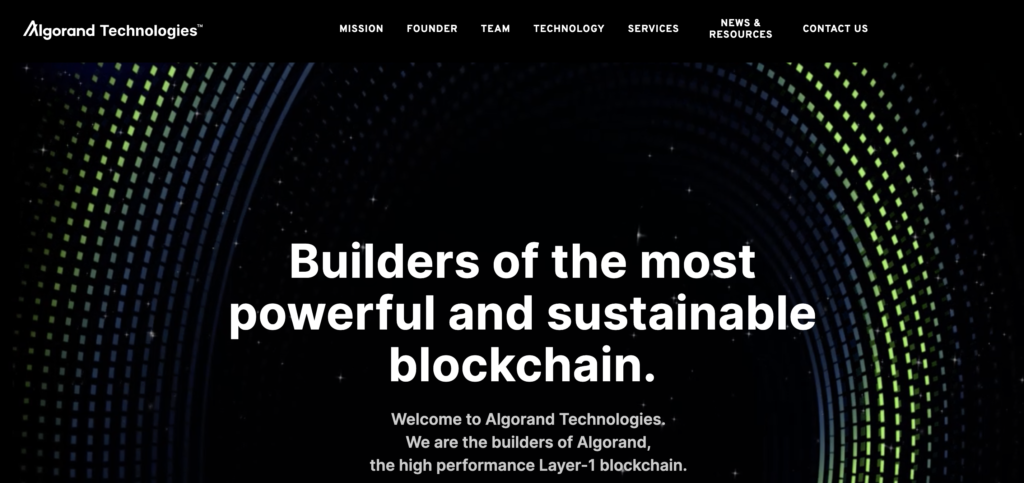
What is Algorand?
Algorand is a decentralized blockchain platform designed to facilitate seamless cryptocurrency transactions and enable the development of scalable, secure applications. At its core, Algorand addresses the classic blockchain trilemma: achieving security, scalability, and decentralization simultaneously without compromises. It is built to support a wide range of applications, from financial services and asset management to complex governance protocols, by providing an infrastructure that boasts minimal transaction fees, immediate transaction finality, and robust security measures. The platform’s primary goal is to create an inclusive and accessible digital economy, where anyone can transact and build applications efficiently and equitably.
Project History
Algorand was officially launched with the aim of revolutionizing the blockchain landscape by introducing a pure proof-of-stake (PPoS) consensus mechanism, which was distinct from the more traditional proof-of-work systems that dominated the industry. This innovation not only reduced the energy consumption typically associated with blockchain computations but also significantly sped up transaction times, addressing one of the major hurdles in blockchain scalability.
Over the years, Algorand has marked several key milestones that underscore its growth and adoption. It started with the release of its mainnet, which demonstrated the practical viability of its PPoS consensus mechanism. Following this, the platform underwent several upgrades to enhance its capabilities, including improvements in smart contract functionality and the introduction of features to support complex applications like decentralized finance (DeFi) solutions and non-fungible tokens (NFTs). These developments have helped establish Algorand as a versatile and powerful platform that continues to attract developers and users aiming to leverage blockchain technology for diverse and innovative applications.
How Algorand Works
Algorand’s innovative approach to blockchain technology centers around its unique implementation of the Pure Proof of Stake (PPoS) consensus mechanism. This foundational technology distinguishes Algorand from other blockchain systems that often rely on traditional Proof of Work (PoW) or delegated Proof of Stake (dPoS) mechanisms. Algorand’s PPoS does not require the energy-intensive mining processes typical of PoW networks, nor does it centralize control as seen in many dPoS systems where only a few stakeholders make the majority of decisions.
Blockchain Structure
At the heart of Algorand’s functionality is its blockchain structure, designed to support high throughput and immediate transaction finality without the risk of forks. This is achieved through a unique two-tiered structure: the first layer handles basic transactions and smart contracts that require standard processing speeds and capacities, while the second layer is reserved for more complex operations and customized smart contracts, which may require additional computational resources. This dual-layer architecture ensures efficiency and flexibility, enabling Algorand to cater to a wide array of applications without bottlenecking network performance.
Consensus Mechanism
The PPoS consensus on Algorand operates on a principle of random and secret selection of validators, ensuring that the network remains secure and decentralized. Each ALGO token holder can participate in the consensus process, with their influence proportional to their stake in the network. Validators are randomly selected to propose blocks and vote on proposals, and the identity of these validators changes with each new block, significantly enhancing network security against attacks targeting specific nodes.
This mechanism is crucial for maintaining the integrity and security of the Algorand blockchain while ensuring that all transactions are processed swiftly and without unnecessary delays. By leveraging cryptographic sortition, Algorand ensures that the system remains open and fair, allowing an equal opportunity for all staked participants to contribute to the network’s operation.
Technical Innovations
Algorand also incorporates several other technical innovations that enhance its performance and utility. For instance, the Algorand blockchain is capable of handling large transaction volumes with negligible transaction fees, which is a significant advantage for both developers and users. Furthermore, the platform supports atomic swaps and layer-1 smart contracts, which are secure and cost-effective for creating decentralized applications (dApps). These features, combined with the robust security measures and the decentralized nature of the PPoS mechanism, make Algorand a standout project in the blockchain space, providing a scalable, secure, and developer-friendly platform.
Tokenomics of Algorand
Algorand utilizes its native cryptocurrency, ALGO, which functions as a coin rather than a token. As a coin, ALGO is used not only as a medium of exchange within the Algorand network but also plays a crucial role in network security through its involvement in the consensus mechanism.
Emission Model
Algorand’s emission model is designed with a long-term fixed supply cap of 10 billion ALGOs, which are introduced into the system at a declining rate over time. This approach aims to reduce the inflation rate gradually as the supply approaches the cap, creating a deflationary pressure that can potentially increase the coin’s value over time. The initial distribution of ALGOs was conducted through auctions, which also served as a price discovery mechanism and a way to distribute the coins fairly among participants.
Participation Rewards
One of the unique aspects of Algorand’s tokenomics is its participation rewards system, which incentivizes all ALGO holders to participate in the network’s security by staking their coins. These rewards are distributed to all ALGO holders who keep their wallets online and thereby contribute to the network’s PPoS consensus mechanism. This system encourages widespread participation and helps maintain a high level of network security.
Transaction Fees and Governance
Transaction fees on the Algorand network are nominal, designed to prevent spam transactions while remaining accessible for regular users and developers. These fees are burned, which means they are permanently removed from circulation, contributing to the deflationary aspect of ALGO’s economics. Additionally, ALGO holders can participate in the governance of the network, where they can vote on key decisions and future developments, further tying the utility of the coin to the governance and operational efficiency of the platform.
Exchange Rate Dynamics
The value of ALGO fluctuates based on market conditions, adoption rates, and the overall health of the crypto market. As Algorand continues to develop and add new features and partnerships, these activities can influence the perception of ALGO’s value among investors and users. The coin’s exchange rate is also affected by the broader economic factors that impact the cryptocurrency market, including regulatory news and technological advancements in the sector.
By integrating these economic models, Algorand ensures that ALGO is not only a fundamental aspect of network operations but also a potential investment vehicle that benefits from the growth and success of the platform.
Where to Buy ALGO
ALGO, the native coin of the Algorand blockchain, is widely available on several major cryptocurrency exchanges. Interested buyers can access ALGO on:
- Binance: One of the largest and most popular cryptocurrency exchanges globally, offering a range of trading pairs for ALGO including fiat and crypto options.
- HTX (formerly Huobi): A well-established exchange known for its robust platform and a wide selection of cryptocurrencies, including ALGO.
- MEXC Global: Offers trading in ALGO with various cryptocurrencies, known for its user-friendly interface and supportive community.
- Bybit: Known for derivatives and spot trading, Bybit also offers ALGO trading, catering to both beginners and experienced traders.
- KuCoin: Popular among traders for its wide range of cryptocurrencies and user-friendly platform, KuCoin supports multiple ALGO trading pairs.
These platforms provide ample liquidity, making them ideal venues for buying and trading ALGO.
Where to Store ALGO
Storing ALGO safely is crucial for both new and seasoned investors. Here are some of the most reliable wallets for storing ALGO:
- Algorand Wallet: The official mobile wallet created by the Algorand team, designed specifically for storing, sending, and receiving ALGO. It offers features like participation in consensus by staking, which can earn holders rewards.
- Ledger Nano X/S: These hardware wallets are among the safest options available, as they store ALGO offline, greatly reducing the potential for hacks. Both models support Algorand, allowing users to manage their coins directly from their device.
- MyAlgo Wallet: A web-based wallet that provides a convenient and secure way to manage ALGO. It supports all major features of Algorand, including participation in governance and staking.
- Atomic Wallet: A desktop and mobile wallet that supports ALGO along with hundreds of other cryptocurrencies. It offers an intuitive interface for easy management of assets.
- Trust Wallet: A mobile wallet that supports a wide range of cryptocurrencies including ALGO. It provides a secure system for transactions and a straightforward user interface.
Each of these wallets offers different features and levels of security, from cold storage options like Ledger, which provide maximum security, to more accessible but highly secure software wallets like the Algorand Wallet and Trust Wallet. Choosing the right wallet will depend on the user’s specific needs for security, convenience, and functionality.
Project Prospects
Algorand’s growth is underpinned by its innovative Pure Proof of Stake (PPoS) consensus mechanism, which ensures scalability, security, and decentralization. The platform’s ability to handle high transaction volumes with low fees and immediate finality makes it attractive for various applications, from decentralized finance (DeFi) to enterprise solutions.
Clients and Partners
Algorand has established partnerships with a diverse range of clients and organizations, highlighting its broad appeal and utility. Key partners and clients include:
- Circle: Utilizes Algorand for USDC, a stablecoin used widely in DeFi applications.
- Republic: An investment platform that leverages Algorand for secure, transparent asset management.
- IDEX: A decentralized exchange (DEX) that runs on Algorand, benefiting from its high throughput and low transaction costs.
- Marshall Islands: The sovereign nation is developing its national digital currency on Algorand, showcasing the platform’s suitability for large-scale governmental projects.
These partnerships underscore Algorand’s versatility and ability to meet the needs of both financial institutions and governmental bodies.
Growth Forecast
The outlook for Algorand is promising, driven by its strong technological foundation and increasing adoption across various sectors. As blockchain technology continues to evolve, Algorand’s focus on scalability and security positions it well to capture a significant share of the market. The ongoing development of new features, such as improved smart contract capabilities and enhanced privacy features, will likely attract more developers and enterprises to the platform.
Additionally, the growing interest in DeFi and NFTs, areas where Algorand has already made significant inroads, suggests robust future growth. The platform’s ability to adapt to changing market demands and technological advancements will be crucial in maintaining and expanding its user base.
Project Ecosystem
Algorand boasts a rich and dynamic ecosystem, supported by a wide array of applications and services that leverage its blockchain technology. This ecosystem includes:
- DeFi Applications: Various DeFi projects utilize Algorand for lending, borrowing, and trading activities due to its high efficiency and low fees.
- NFT Platforms: The platform supports several NFT marketplaces and projects, taking advantage of its scalability and speed.
- Payment Solutions: Multiple payment processors and financial services use Algorand for fast and secure transactions.
- Enterprise Solutions: Companies in various industries, from supply chain management to real estate, employ Algorand for its robust blockchain capabilities.
Key components of the ecosystem include:
- Algorand Foundation: Focuses on promoting the Algorand ecosystem through grants, education, and research initiatives.
- Algorand Wallets: A variety of wallet options, including the official Algorand Wallet, Ledger, and MyAlgo, support the storage and management of ALGO.
- Developer Tools: Comprehensive development kits and APIs provided by Algorand make it easier for developers to build and deploy applications on the network.
This thriving ecosystem is a testament to Algorand’s ability to support a wide range of use cases and its potential for ongoing innovation and expansion.
Conclusion
In conclusion, the exploration of Algorand reveals a robust platform designed with innovation and scalability at its core. Its continued growth and adaptation in the face of evolving market demands highlight its potential to significantly impact the future of blockchain technology. As Algorand continues to expand its ecosystem and refine its offerings, it remains a noteworthy example of how advanced blockchain solutions can meet modern-day economic and technological challenges. The ongoing developments and strategic initiatives will undoubtedly shape its trajectory and influence in the wider crypto and financial landscapes.

